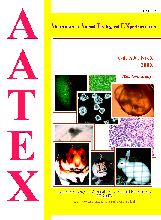A sensitive cell transformation assay for tumor initiators as well as promoters has been developed using a v-Ha-
ras-transfected BALB/c 3T3 cell line, Bhas 42. In order to establish the method as a routine procedure, we have conducted a NEDO Project for the confirmation of its usefulness. Six laboratories joined in this project and examined nine chemicals, so as to be tested for a chemical by three laboratories. Judgments on carcinogenic compounds, N-methyl-N'-nitro-N-nitrosoguanidine and benzo[
a]pyrene, were positive in the initiation assay and negative in the promotion assay. Although benz[
a]anthracene is a carcinogen and pyrene is reported to be non-carcinogenic to animals, they gave positive results in both initiation and promotion assays. Anthracene, a non-carcinogen, was negative in both initiation and promotion assays. Mezerein, lithocholic acid and methapyrilene hydrochloride, known to act as tumor promoters, were judged positive in the promotion assay and negative in the initiation assay. Phorbol, a negative control for tumor-promoting phorbol esters, was shown negative in both initiation and promotion assays. In conclusion, this inter-laboratory collaborative study demonstrated that the Bhas 42 cell transformation assay is reproducible and applicable to the detection of both initiators and promoters, leaving the possibility of more improvement by the modification of the protocol and guidance for the procedure.
View full abstract
